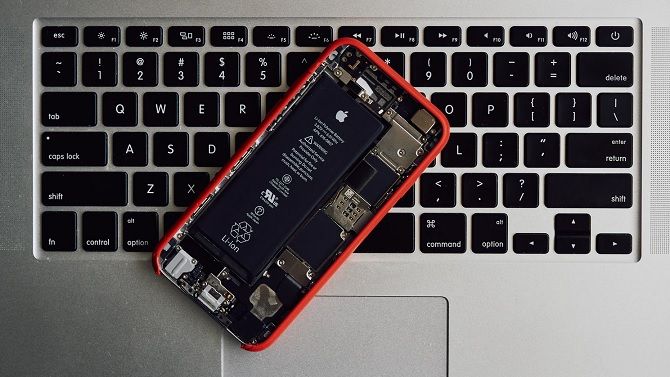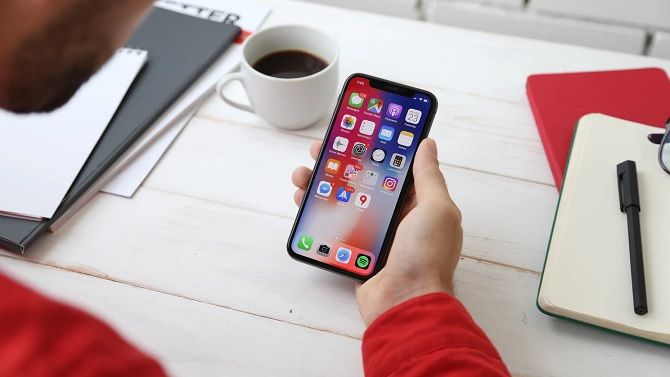By Philip Bates,
How can you tell if your phone is tapped? Like it or not, most of us have grown used to our phones being spied upon—not at least by governments!
But other parties can tap into your smartphone. This includes hackers, your employer, an ex-partner, or the press! They might be listening in to your calls, reading and sending texts and emails, or altering information on your interface.
Here’s how to tell if your cell phone has been tapped.
1. Incessant Battery Problems

Before iOS and Android caught on, battery troubles were a sign of a phone tap. Hot batteries remain a concern when it comes to smartphones.
You’re probably very familiar with an overheating battery anyway. You might have even visited a phone store and inquired about the issue. In most cases, you’ll simply be told it’s standard for smartphones. Apple, for example, typically only worries if your device has got so hot, it’s shut itself down.
Why does your smartphone get so hot? Using numerous apps and consuming endless media will make your handset warmer, though this shouldn’t be enough to cause any damage to you or itself.
However, a hot battery can also be a sign of cell phone tapping. Uninvited software could be running in the background, allowing someone else to listen in.
Furthermore, be suspicious if your phone simply isn’t holding charge.
Monitor your phone: remember which apps you’ve used and how they affect your battery. If it consistently runs low on battery, despite you not using it that frequently, that’s too strange to ignore.
Older handsets don’t hold charge as well as newer models, however, so you need to eliminate other possibilities before looking for nefarious purposes.
Equally, you need to take note of other reasons your handset might be hot. Have you been sunbathing with it nearby? Have you been using lots of apps consecutively? Is a phone case locking heat in? Is another device connected via Bluetooth?
High temperatures and low power can nonetheless be indicative of malicious software. You then need to look out for other signs your phone is tapped…
2. Increased Mobile Data Usage
Keeping a close eye on your phone bills can save you a lot of cash. But it can also help you spot spyware.
Countless apps vacuum up huge amounts of data, especially if you don’t connect to free Wi-Fi offered by many stores (because this can be a security concern too). It’s even worse if you let your kids use your device while away from home. Still, you should know roughly how much data you use each month.
5 Ways Hackers Can Use Public Wi-Fi to Steal Your IdentityYou might love using public Wi-Fi -- but so do hackers. Here are five ways cybercriminals can access your private data and steal your identity, while you're enjoying a latte and a bagel.READ MORE
If this amount increases dramatically, you need to narrow down exactly why that’s happening—and if you can’t find the reason, it might that a third party is intercepting your messages.
Malicious software uses your data allowance to send information it’s collected to an outside source. That means it’s not solely relying on your home Wi-Fi: it’ll be consuming data wherever you are.
3. Unwanted Ads and Apps

You know your phone like the back of your hand—which is to say, not very well. You become overly familiar with your operating system, meaning you forget half the apps on there.
But it’s imperative that you know exactly what’s on your phone, especially the apps running in the background. If you’ve not installed them, they could be malicious.
One such piece of malware that tampers with your cell is Hummer. This Trojan infected about 1.4 million Android devices per day in early 2016. First spotted in 2014, it was most prevalent in countries like India, Russia, and the Philippines.
It’s estimated that, if the virus creators (likely based in China) got just $0.50 per infection, they could have made a profit of over $500,000 in just 24 hours.
Victims will see intrusive ads too because malicious software doesn’t always hide itself. Once installed, Hummer aims to obtain root access—i.e. administrative rights—to your device. This allows it to download unwanted content, and makes it incredibly difficult to get rid of. Even initiating a factory reset doesn’t work.
Malware can generate a lot of ad traffic, and thus increase data usage further.
4. General Performance Issues
It’s only natural that, the more data being used, the slower your device will be.
HummingBad is similar to Hummer, a Trojan with an estimated 10 million victims. It finds its way onto a device when a user accidentally downloads a fraudulent app. Fake versions of YouTube or WhatsApp, for instance, can still be found on the App Store.
7 Tips for Avoiding Fake Apps on Mobile App StoresConcerned about fake mobile apps hiding malware? Here's how to spot fake apps on your phone's app store.READ MORE
Cybercriminals made $300,000 a month from HummingBad, notably in 2016—though it’s since enjoyed a resurgence.
The malware also gets root access, or, in some cases, tricks you into downloading a fake systems update for complete domination over your activities. It then promotes pop-up advertisements, and transmits information to a server controlled by Yingmob, a group of Chinese hackers. In addition to so-called “click-fraud”, HummingBad could intercept all your messages.
Think of all that information being transmitted to and from your smartphone or tablet! This will slow down your device, and you might think it’s simply that your handset is getting old…
It’s not isolated to HummingBad. You’ll suffer performance lags whatever method a cybercriminal uses to bug your phone.
Of course, real apps will take up power, but they shouldn’t noticeably affect your device’s reaction time.
You can check which apps are using the most RAM. On iOS, you just need to go on Settings > General > iPhone Storage. On Android, click Settings > Apps and swipe over to Running. You’ll probably see Photos and Music near the top of the list. From here, you can properly assess your app usage, and check for anything that doesn’t ring true.
5. Strange Texts and Messages

How do you know if your phone is tapped or being spied on? You might be ignoring the signs already!
What you might pass off as spam, a nuisance, or a wrong number can be an alert that something’s wrong.
Suspicious SMS will be a seemingly-randomized series of digits, characters, and symbols, which will immediately strike you as odd but perhaps not especially malicious.
Do not ignore them.
The most likely cause of this is a fault in spyware used by cybercriminals. If it hasn’t installed properly, coded messages will appear in your inbox that would otherwise have gone unnoticed. These random data sets are instructions sent from the servers of a hacker to tamper with the fraudulent application. Alternatively, it could be the app trying to contact its creator.
Likewise, if any family or friends say you’re sending them bizarre texts or emails, this is a sign that your phone is compromised. This could mean your infected phone is trying to install malware on the devices of your loved ones.
Keep an eye out for any activity you don’t recognize. Look at messaging chains, social media profiles, and check your sent folder and outbox. If you can’t remember sending something, be suspicious.
7 Important Email Security Tips You Should Know AboutInternet security is a topic that we all know to be important, but it often sits way back in the recesses of our minds, fooling ourselves into believing that "it won’t happen to me". Whether...READ MORE6. Websites Look Different

This is a tricky one, but staying vigilant could save you getting ripped off.
It’s a scam we’re all familiar with, but no one’s infallible. We all forget advice, and make mistakes. If that mistake is clicking on a URL in a text or email, it can cost you big bucks.
However, you don’t even have to be redirected to a fraudulent link through a message. If there’s a malicious app on your phone, it could alter the appearance of websites you frequent.
The malware acts as a proxy, intercepting communications between you and the site you’re trying to visit. It might be presenting a false page to you, or simply keeping track of anything you type. And no, it doesn’t matter if you’re on Private Browsing.
This really becomes a problem if you’re using a site that requires personal details. That could be a password, financial details, or mere Personally Identifiable Information (PII), which is a major currency on the Dark Web. PayPal, for example, is a worry; so too is mobile or online banking.
Here's How Much Your Identity Could Be Worth on the Dark WebIt's uncomfortable to think of yourself as a commodity, but all of your personal details, from name and address to bank account details, are worth something to online criminals. How much are you worth?READ MORE
You might not notice any differences. They could solely be minor changes, like pixelated logos. And even if you do see something strange, it could just be the website experimenting with a new interface. Compare the mobile version with that displayed on a PC, bearing in mind responsive themes will look slightly different.
How Can You Tell If Your Phone Is Tapped?
Don’t be overly paranoid—most of us won’t be victims to a phone tap. Nonetheless, it’s worth brushing up on some security measures.
Reduce risk of infection by only downloading from official app stores; Apple and Google screen apps and games before letting them become available to the masses. Knowing which is the most secure mobile operating system can be helpful, and keep your eyes peeled for signs that your phone has malware.
What Is The Most Secure Mobile Operating System?Battling for the title of Most Secure Mobile OS, we have: Android, BlackBerry, Ubuntu, Windows Phone, and iOS. Which operating system is the best at holding its own against online attacks?READ MORE
1 comment:
Are Darkweb PayPal transfer Darkweb PayPal transfer Legit .? Testing live from deep web. Legit one!
Post a Comment